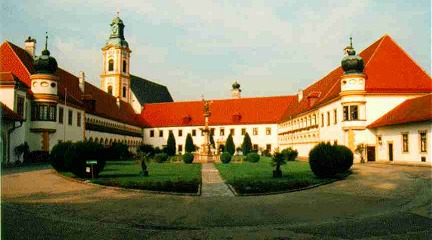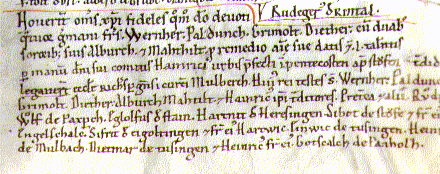

|
The first historic mention of Panholz known to us, occurred in 1180 in the "Traditionscodex" (#184) of the Upper Austrian Augustinian monastery Chorherrenstift Reichersberg am Inn - without reference to the geographical location of the name Panholz cited. |

|
Oldest known historic document mentioning Panholz place name and person: Gotschalc de Panholz in 1180. (reference kindly supplied by Dr. Isolde Hausner, Vienna) |
The text (the meaning of which is fairly easy to grasp even for the non-scholar) deals with a private donation of 50 Talents to the Reichersperg abbey, Gottschalk de Panholz being one of several witnesses to the deed.
Abbreviations and misspellings in the 1180 original manuscript have been "translated" in the above quoted text, taken from the "URKUNDEN-BUCH des Landes ob der Enns (hrsg. Museum Francisco Carolinum Linz, Wien k.k. Hof- und Staatsdruckerei 1852, VOL I, p.41). Gotscalch is still misspelled und should probably be Gotschalc (as in Engelschalc, higher up).

Up to the 15th century, personal names in the form of Gottschalk de Panholz, ie [first name] from [domain, hamlet, village or town] were in common use, rather than the use of a "family name" composed of the place name [domain, hamlet, village or town] and the added ending "er" such as "Panholzer" ("Pichler", "Brucker" etc.). The first reference found for the "family name" Panholzer is a J. Panholzer 1394 in Tyrol (Josef Tarneller, Hofnamen im Burggrafenamt, Verl. Unterberger, 1986, S.156).
During the historical period of Old-High-German (during the early Middle Ages) the word holz (engl. "wood") was the preferred designation for a forest, rather than "wald".
A study of the linguistic roots of the name Panholzer reveals that the name most common appearance occurs in Upper Austria (East-Middle-Bairisch). In fact, this is quite visible on my mapping of these places.